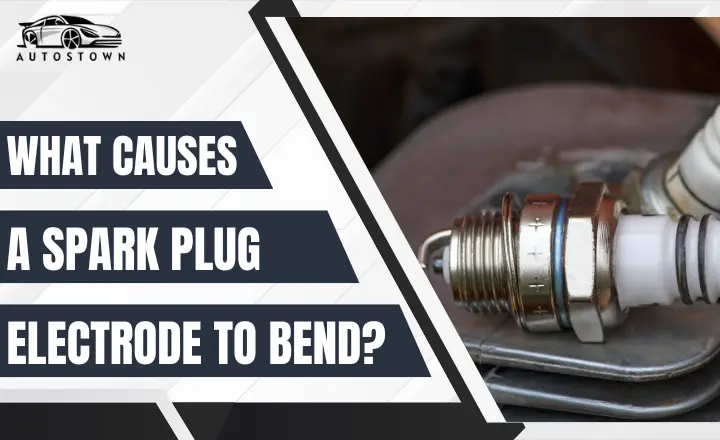Have you ever noticed why your car’s engine began to misfire or run rough? A bent spark plug electrode is one possible cause. The tiny but critical portion of the spark plug responsible for igniting the air-fuel mixture in the combustion chamber can occasionally flex, resulting in a slew of performance difficulties. But what is the specific cause of this bending phenomenon? In this post, we’ll look at what causes spark plug electrode to bend and how it can impair your vehicle’s overall performance. So strap in and prepare to unravel the mysteries of those illusive twisted electrodes!
What Causes Spark Plug Electrode To Bend
Here are the ten causes of spark plug electrode to bend:
1. Poor Quality Spark Plug Material:
Poor quality spark plug materials might result in a weak electrode that is more prone to bending as combustion pressure builds up. Poor high-quality spark plug material can cause a plethora of problems, with one commonplace problem being the bending of the spark plug electrode. This occurs whilst the electrode cloth is not capable of facing up to the high temperatures and strain inside the combustion chamber.
2. Excessive Engine Knocking:
If the knocking sounds come from your engine often, the spark plug electrode will be under too much pressure and eventually bend from the stress. Excessive engine knocking can be a concerning difficulty for plenty of automobile proprietors.
It is often because of untimely ignition of the air-fuel aggregate, resulting in more than one flame front colliding within the combustion chamber. One intriguing thing to bear in mind is the potential effect of bent spark plug electrodes on engine knocking.
3. Over-Tightening During Installation:
When fitting or installing a spark plug, excessive effort can compress the electrode too much, which can cause early bending and decreased efficacy.
4. Carbon Buildup:
The buildup of carbon deposits on the electrodes may cause temperature increases and modifications to the heat dissipation mechanism, which in turn may cause electrode deformation or turn the spark plug black.
5. Improper Gap Adjustment:
An improperly adjusted spark plug electrode gap might result in inconsistent firing, higher resistance, and eventually bending from sustained strain.
6. Fuel Additives Containing Abrasive Materials:
Abrasive materials found in some fuel additives can hasten spark plug electrode degradation and increase their susceptibility to bending. These additives contain abrasive materials, which has sparked concerns about how they may affect engine parts, especially spark plugs. According to recent research, fuel additives containing abrasives may hasten the spark plug electrode’s deterioration and eventually cause it to bend too soon.
7. Ignition Timing Issues:
An uneven ignition timing can lead to unpredictable combustion events and uneven pressure spikes inside the cylinder, which over time raises the possibility of electrode bending.
8. High Compression Ratio Engines:
Higher internal pressures during combustion in high compression ratio engines can cause additional stress on the spark plug electrodes, bending them.
9. Turbocharged or Supercharged Engines:
If forced induction systems like superchargers or turbochargers are not correctly regulated, the increased pressure inside the cylinders during combustion may also lead to spark plug electrode bending.
10. Operating at Extreme Temperatures:
The materials in the electrodes of spark plugs can deteriorate and finally bend under stress if an engine is run continuously at extremely high or low temperatures without appropriate thermal control.
RELATED:-How To Read A 2 Stroke Spark Plug – 6 Steps
Conclusion
Numerous elements exist that each have a distinct effect on the performance of spark plugs and can be linked to the bending of spark plug electrodes. Many factors, such as high temperatures, engine misfires, improper gap settings, and low-quality gasoline, might cause this problem. Maintaining the correct operation of spark plugs and averting possible engine damage need an understanding of these reasons.
Through the resolution of these fundamental problems and the routine examination and replacement of spark plugs when required, motorists may guarantee peak engine efficiency and extend the longevity of their automobiles. To avoid more catastrophic problems later on, automobile owners must remain watchful and take prompt action when they notice any signs of electrode bending.
FAQs
1. What is a spark plug electrode?
A spark plug electrode is a metal component found at the center of a spark plug that helps generate an electrical spark to ignite the fuel-air mixture in an internal combustion engine.
2. How does fouling lead to electrode bending?
Fouling on the spark plug can create uneven combustion and increased heat, causing the electrodes to warp or bend over time.
3. Can a spark plug electrode bend?
Yes, under certain circumstances, such as high engine temperatures or excessive wear, a spark plug electrode can bend or become damaged.
4. What are the common signs of a cracked spark plug?
Common signs of a cracked spark plug include poor engine performance, rough idling, misfires, and visible damage on the ceramic insulator or metal shell.
5. Is it necessary to replace a spark plug with a bent electrode?
In most cases, yes. Bent electrodes can negatively affect engine performance and should be replaced promptly to ensure optimal combustion and prevent further damage.

